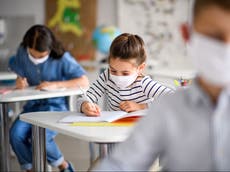Opening windows more effective than masks in stopping school Covid transmission, says scientist
‘Improving air exchanges’ key to lowering risk, says Sage adviser
Your support helps us to tell the story
From reproductive rights to climate change to Big Tech, The Independent is on the ground when the story is developing. Whether it's investigating the financials of Elon Musk's pro-Trump PAC or producing our latest documentary, 'The A Word', which shines a light on the American women fighting for reproductive rights, we know how important it is to parse out the facts from the messaging.
At such a critical moment in US history, we need reporters on the ground. Your donation allows us to keep sending journalists to speak to both sides of the story.
The Independent is trusted by Americans across the entire political spectrum. And unlike many other quality news outlets, we choose not to lock Americans out of our reporting and analysis with paywalls. We believe quality journalism should be available to everyone, paid for by those who can afford it.
Your support makes all the difference.Opening windows to ventilate a classroom is more effective than wearing a face mask in preventing the transmission of coronavirus in schools, a government scientific adviser has said.
Professor Calum Semple, a member of the Scientific Advisory Group for Emergencies (Sage), told BBC Radio 4’s Today programme that “improving air exchanges” was the best single measure schools could take to lower the risk of the virus spreading.
“If I had to invest in a single activity to improve the environment both for the children and the adults, I’d be looking at improving the ventilation, unsealing windows that have been painted shut and kept shut for energy-saving reasons ... improving air exchanges,” he said.
“That would be a much more effective way to reduce transmission in schools.”
Asked about the risk to teachers, Prof Semple, speaking in a personal capacity, said the data showed teachers going to school “are no more at risk than people in general society going about their daily living and normal working environment”.
His comments came after some schools said pupils must wear face coverings at all times, except during sports lessons or when eating or drinking, when they return in 10 days.
Nick Gibb, the schools minister, has said face coverings and asymptomatic Covid-19 tests in secondary schools will not be compulsory when pupils in England return to class next month.
He acknowledged that it was “more challenging” to teach children while wearing masks, although he said they were “highly recommended”.
He told Times Radio: “Of course we can’t make it mandatory on parents but we just hope that most parents will see the wisdom of testing their children twice a week.”
Asked whether it should be a case of “no test, no school”, Mr Gibb told LBC radio: “No, we want to make sure it is not compulsory in that sense, and they will need the permission of the parents.
“In all these things, it is a balance of risk and just having anybody tested, frankly, and identifying asymptomatic cases is a bonus in terms of minimising the risk.”
He said he hoped the vast majority of pupils would volunteer to use the lateral flow tests.
Primary school children will not need to take a rapid coronavirus test when they return to class.
On face coverings, Mr Gibb told BBC Breakfast: “We are saying it is not mandatory for schools to have masks in classrooms but it is highly recommended because we want to do everything we can to reduce the risk of transmission in the school.”
His comments come after the National Deaf Children’s Society warned that the government’s recommendation for face coverings to be worn could have a “devastating” effect on youngsters with hearing difficulties.
The Department for Education (DfE) has said teachers should continue to be sensitive to the additional needs of their pupils, such as deafness, in deciding whether it is appropriate to wear a face covering.
Additional reporting by Press Association


Join our commenting forum
Join thought-provoking conversations, follow other Independent readers and see their replies
Comments